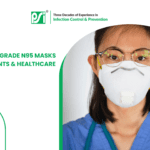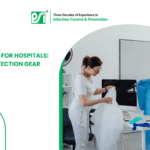The Importance of ISO 13485 Certification for Organizations
Medical mask manufacturers and manufacturers of medical devices should focus on meeting ISO 13485, the worldwide standard for quality management systems. While accelerating your path to market, certification ensures the confidence of your regulators, stakeholders, and potential consumers. Undeniably, it’s a complicated procedure that must be carried out accurately. However, your organization can only unlock and integrate long-lasting ISO 13485 compliance with some professional advice and the appropriate toolset.
This blog will provide all the information you need and the importance of ISO 13485 certification for surgical mask manufacturers in India and all organizations. Let’s dig in!
Five Key Elements of ISO 13485
Medical device and medical mask manufacturers must adhere to the standards outlined in ISO 13485, which cover the whole process, from initial concept through post-production. Here are the top five standards from ISO 13485 that must be met by any organization hoping to get the certification.
Quality Management System (QMS)
To be accredited to ISO 13485, an organization should develop and establish a quality management plan that complies with the requirements in the benchmark. This section discusses the essential criteria for quality management systems and the documents required to set up and sustain an efficient quality management system.
ISO13485
ISO stipulates the following for medical mask manufacturers and disposable drapes manufacturers:
Identify the procedures that the quality management system demands, as well as the steps necessary to implement them throughout the whole organization while taking into consideration the varied roles involved
Control the relevant procedures required for the quality management system using a risk-based approach, and
Determine how these processes interact
Resource Management
The resources that life sciences organizations should use to develop and keep up the efficacy of the quality management system are laid out in this phase. It lays forth the standards that must be met to satisfy important statutory and customer demands.
(1).jpg) The sources included in this section consist of the following:
The sources included in this section consist of the following:
- Infrastructure
- The provision of resources
- Work environment
- Contamination control
- Human resources
- Management Responsibility
The specific tasks and duties of management concerning the implementation and upkeep of quality management systems are described in this section.
In brief, management must showcase its dedication to the quality management system’s creation, upkeep, and efficacy. For that:
- Stress the importance of adhering to regulations
- Establish a high-quality policy
- Establish quality goals and make ensure they’re achieved
- Review your management practices periodically
- Make sure resources for the quality management system are available
- Measurement, Analysis, Improvement
According to ISO, the quality management system and product analysis, monitoring, measurement, and product improvement procedures must be designed and carried out.
To achieve this, medical mask manufacturers in India must:
- Show that the product is in conformity
- A compliant quality management system is essential
- The quality management system must continue to function effectively
Product Realization
Many organizations often need to pay more attention to the planning phase in their haste to start developing products. Your realization efforts must be well-planned.
To be more precise, you should
- Determine the standards of quality for your product (s)
- Define your necessary procedures and the accompanying documentation that will be required for them.
- Describe the infrastructure the organization will need to build and what the workplace should look like.
- Specify the qualifications and experience criteria for employees.
- Create your measurement, monitoring, inspection, handling, storage, distribution, and traceability procedures.
- Finally, you must arrange all the data to make it easy to access and understand.
Benefits of Attaining an ISO 13485 Certification
Implementing a culture of continuous improvement and quality within your medical device organization.
- Improved customer/patient satisfaction – via periodically supplying safe medical devices that satisfy customer needs
- Improved reputation and credibility – by obtaining ISO 13485:2016 certification, you can show stakeholders, such as clients, suppliers, and partners, that your company takes quality seriously.
- Greater efficiency – ISO 13485:2016 can assist you in simplifying your procedures, improving the overall efficiency of your organization.
- Cost savings – Implementing ISO 13485:2016 can result in less waste, rework, and other inefficiencies, lowering overall expenses for your organization.
- Better risk management – By establishing a solid quality management system, you can more easily detect and manage risks related to your medical devices.
- A greater foundation for expansion – ISO 13485:2016 could be a strong foundation for your company to grow and expand into new markets.
Conclusion
After reading this blog, you must have understood the importance of ISO 13485 certification and the benefits it can bring to one’s organization. PSIDispo, one of the leading disposable mask manufacturers and medical mask manufacturers in India, has adopted ISO 13485, the Quality Management System standard, and fully complies with all of its standards. Our quality management system emphasizes the safety and effectiveness of all of our medical equipment, which is suitable and effective for our consumers!



